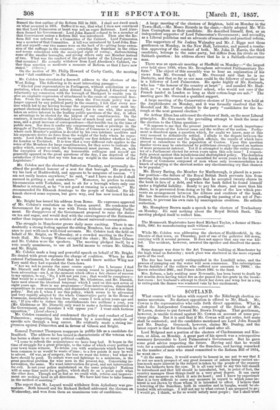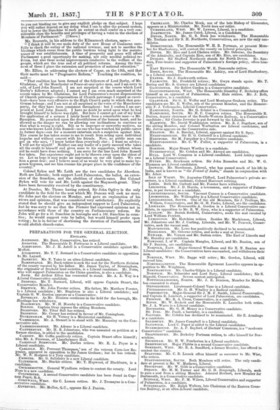SCOTLAND.
What course will be taken with respect to the Edinburgh election remains uncertain. No distinct opposition is offered to Mr. Black Mr. Cowan is the representative who calls forth direct opposition. What is called the Independent Committee, composed of the friends of Mr.. M'Laren, desires to put forward Mr. Brown Douglas. That gentleman, however, is unable to stand against Mr. Cowan on account of some previous pledge. But it is said that if Mr. Cowan will not retire, both seats shall be contested ; and the candidates mentioned are Lord John Russell; and Mr. Dunlop. Greenock, however' claims Mr. Dunlop, and the latest report is that for Greenock he will stand after all. Lord Meigund met a portion of the electors of Clackmannan and Kinross, at Alloa, on Monday. A great part of his speech was a retrospective summary favourable to Lord Palraerston's Government. But he gave some good advice respecting the future. Having said that he would vote for a considerable extension of the franchise, and having remarked on the number of men who stand committed to the Reform Bill of 1864, he went on— "At the same time, it would scarcely be honest in me not to say that r do not see much prospect of any great measure of reform being earned unless much more interest in the subject istaken by the people of the country than has hitherto been the case. It is all very well to say this bill should be introduced and that bill should be introduced, but, in point of fact, the country manages these things itself in a very great degree. It can carry almost any measure on which it sets its heart and I know by expenence that it is very difficult to carry any measure in regard to which some interest is not shown by those whom it is intended to affect. I believe that a lowering of the franchise, both in counties and in burghs, would be attended with advantage. I will not say to what extent I am prepared to go; I would go, I think, as far as would. satisfy most people; but shall truirt
to you not binding me to give any explicit pledge on that subject. I hope you will rather depend on my doing what I can to alter the present system, and to lower the franchise to such an extent as shall confer on a very considerable class the benefits and privileges of having a voice in the election of Members of Parliament." (Cheers.) Mr. Bouverie, in his address to the Kilmarnock electors, says " I think it will be one main dutyof the new House of Commons carefully to check the outlay of the national revenue, and not to sacrifice the blessings which ensue from the public burdens being light to the maintenance of war establishments. .A. time of prosperity and pace will afford Parliament a good opportunity for making, not only needful political reforms, but also those social improvements conducive to the welfare of the people, which are the true end of all political reforms. Among the foremost of these I place the extension and promotion of national education."
Mr. Ellice, in addressing the electors of Cupar, on the 13th, said that their motto must be "Progressive Reform." Touching the coalition, he said " That coalition has been formed of the followers of Lord Derby, of Mr. Gladstone, of the Manchester or Peace-at-any-price men, and I am sorry to add, of Lord John Russell. I am not surprised at the course which Lord 'Derby's followers adopted ; I cannot say I am even much surprised at the course taken by Mr. Gladstone, for Lord Palmerston's recent dispensations of Church patronage—dispensations of Church patronage I regard as excellent—have been very offensive to the High Church party to which that gentleman belongs ; and I am not at all surprised at the votes of the Manchester party for they have been consistent throughout : but I confess I am surprised at Lord John Russell. I have no doubt he acted upon what he had brought himself to believe was right. But here I cannot get out of my head the application of a sermon I lately heard from a remarkable man—a Mr. Spurgeon. He preached upon the deceitfulness of the human heart, and he allowed us the danger we run by allowing our inclinations to convince us that what is wrong is right. But as to improper or unworthy motives, no one who knows Lord John Russell—no one who has watched his public career in former days—can for a moment entertain such a suspicion against him. The course he has taken seems to me to result from acting upon individual impulse and without concert with his friends. Now, no public man can get on who says, I know better than everybody else ; I want no advice ; I will act for myself.' Neither can any leader of a party succeed who takes all the credit to himself and gives none to his supporters without whose aid he could have done nothing. I am sorry for the line ard John Russell has taken. But experience ought not to be thrown away upon the oldest of us. Let us hope it may make an impression on our old leader. We owe him a great deal ; and I believe most of us would be very glad to make by
gones v and see him resume his proper place in the confidence of the country."
Colonel Sykes and Mr. Leith are the two candidates for Aberdeen. Both are Liberals ; both support Lord Palmerston, the ballot, an extension of the franchise, and the abolition of church-rates. But Colonel Sykes will vote for and Mr. Leith against the Maynooth grant. They have been favourably received by the constituency.
At Dundee, Mr. Thome having retired, Sir John Ogilvy is the only candidate in the field for the seat which Mr. Duncan will seek no more. Sir John met the electors on Monday, and gave an explanation of his views and opinions, that was considered very satisfactory. Ile explicitly stated that he should give an independent support to Lord Palmerston, but he was sorry to see that the Premier had expressed opinions not in accordance with those of the country on Parliamentary reform. Sir John will go for a 51. franchise in boroughs and a 101. franchise in counties • he would support vote by ballot, but would himself prefer open voting ; he is in favour of shortening the duration of Parliaments, and would abolish church-rates.



























 Previous page
Previous page